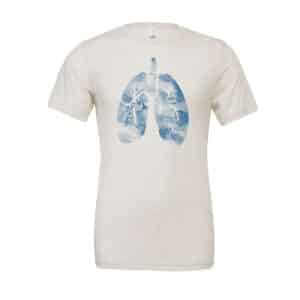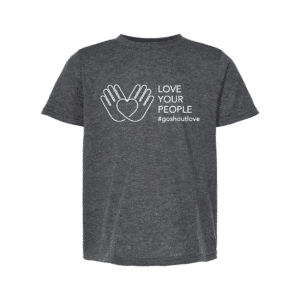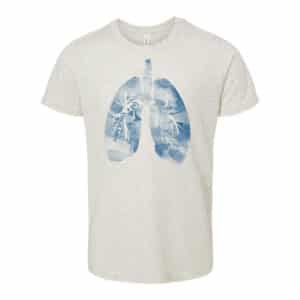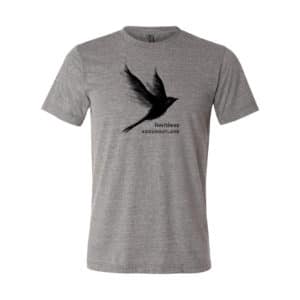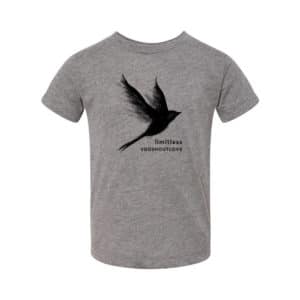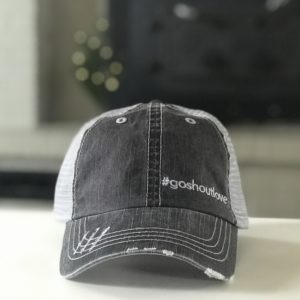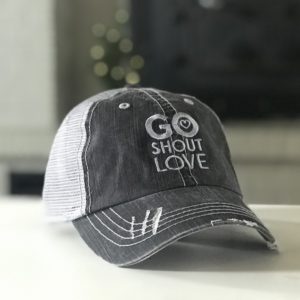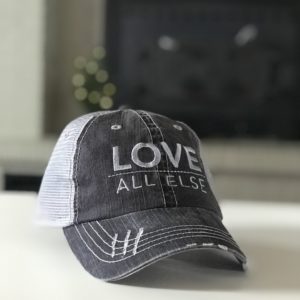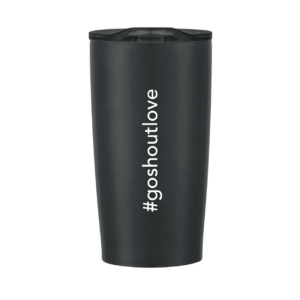Meet Elizabeth & Charlotte
Elizabeth (9) and Charlotte (6) are two sisters from Redding, California who love family game night, building legos, and arts and crafts. This month’s “Stronger Together” design is inspired by the girls’ strength as they navigate uncharted territory together.
We invite you to watch their video, read their story, and subscribe to our podcast to listen to a conversation with their parents.
“Where there is research, there is hope” is a simple phrase that encapsulates the years of tests, labs and advocating that Stephanie and Dustin Madole have done on behalf of their daughters, Elizabeth and Charlotte.
This is their story.
Elizabeth (9) and Charlotte (6) share a rare diagnosis of Generalized Myasthenia Gravis and Systemic Autoinflammatory Disease; a combination of rare diseases that has never been seen before.
“It is impossible to convey their entire journey and there were many times we heard doctors say ‘But that is so rare’ and ‘We have never had a patient who has had this, let alone two’. Overcoming this was difficult in the beginning,” Stephanie shares.
When the family first realized something was wrong, it actually started with their youngest, Charlotte. She was 22 months old and the family had been in and out of the hospital for what was thought to be a virus. Stephanie shares, “They were our first kids, so that is all we knew. We realized something else was going on when Charlotte spiked a 104 degree fever for 13 days, had rashes all over her body and was struggling to walk.”
A Physician Assistant in the local Emergency department confirmed their concerns. Based on Charlotte’s joint pain and high fevers, the PA thought Charlotte had Kawasaki disease, a form of systemic vasculitis. An echocardiogram was ordered which showed a mild dilation on Charlotte’s aortic valve.
Reflecting on that time, Stephanie shares, “Once we got through that, Dustin and I thought that would be the worst we could encounter. Two months later, Elizabeth, who was four at the time, started experiencing the same symptoms. We were so confused. Our girls had shown these symptoms before, but we were recognizing it more. At this point we knew this was not normal.”
The family brought Elizabeth to the hospital where the same doctor saw her. Due to the severity of symptoms and labs, Elizabeth was then life-flighted to the Children’s Hospital where she was also diagnosed with Kawasaki disease, although this diagnosis would later prove to be a misdiagnosis in both girls. This is the case for so many fighting rare diseases.
A few months later, things took a turn for the worse.
“Charlotte stopped playing and walking and wanted to be carried everywhere. I didn’t think much about it until we were getting ready to go to DisneyLand. Charlotte said she couldn’t walk and, at that moment, I thought she was being defiant. The next morning came around and she still couldn’t walk or stand and had very concerning symptoms. I took her to the ER, seeing the same provider yet again. That’s when we found out that Charlotte had a rare immune mediated myopathy and her labs were concerning for Rhabdomyolysis,” Stephanie shares.
By this time, the local Emergency Room Physician Assistant Julie Tankersley and Dr. Karolina Deaugistinishad admitted and life flighted the girls on numerous occasions. Concerned for the girls’ health, they began doing their own research and calling other hospitals and colleagues. They have not only been vital in saving the girls’ lives and helping to establish care in multiple specialties at UCSF, but they have also connected with physicians at National Institute of Health during more critical times.
“Even when they didn’t know exactly what was wrong with our girls at the time, they knew something was, and fought for them,” Stephanie shares, “Physician Assistant Julie Tankerlsy from the local ER, would later reach out to see if she could come over and talk to us. As a mom, it was surprising that a doctor in the ED would want to come over and talk. That’s when we were first introduced to the thought that our girls were likely battling a genetic disease.”
Once Charlotte and Elizabeth met with rheumatology, labs and imaging confirmed the systemic inflammation and pointed to a rare disease called Relapsing Polychondritis. Not all of the girls’ health concerns fit within this diagnosis, so the family finally went to the place you go for rare diseases: The National Institute of Health (NIH).
“NIH is the biggest research facility in the world and they are doing current research on the very disease our girls are battling. NIH and Dr. Marcella Ferrada have given our family hope. Hope that tomorrow will be brighter than today. Hope that our girls have a chance at a cure. She is one of our daughters’ heroes,” gleams Stephanie.
During the family’s first visit to NIH, Elizabeth was progressively getting weaker. She was having a hard time getting off the floor, similarly to what Charlotte had been experiencing. The girls went through more tests and labs which re-confirmed a diagnosis of Systemic Autoinflammatory Disease with Relapsing Polychondritis.
A few weeks later, Elizabeth had an appointment with her rheumatologist. Leading up to the appointment, Elizabeth had been getting weaker. She had been experiencing difficulty walking, talking, chewing, swallowing and playing.
Stephanie recalls, “I remember being in San Francisco with the girls’ and their MiMi (grandma) before their appointment. Walking became increasingly difficult and she needed to use Charlotte’s stroller. I remember thinking whatever was happening to Elizabeth was simply not fair, she couldn’t run on the beach and play like the other kids.”
By the time Elizabeth went to the appointment, she could barely walk.
“I will never forget the look her rheumatologist gave me. The feeling I had at that moment, I knew it was bad. Right away, they decided that Elizabeth would not be going home. She was admitted and we believed the cause was autoinflammatory like Charlotte and she just needed a change in medication management,” Stephanie shares.
For the next two weeks in the hospital, Elizabeth got worse and worse but imaging and labs were coming back normal. Stumped for answers, the rheumatologist decided to get neuromuscular involved.
A neurologist, who specializes in neuromuscular disease, came to visit Elizabeth. He asked some questions no one had asked before, and within five minutes, he had an idea of what Elizabeth was battling. He decided to add a Repetitive Nerve Stimulation onto the nerve study to confirm his suspicions and fifteen minutes later, Dustin and Stephanie finally had their answer.
“The results showed that Elizabeth has significant decrements at her neuromuscular junctions meaning that her brain isn’t able to consistently communicate with her muscles. It’s basically broken,” Stephanie explains.
Immediately, Elizabeth started IV treatment. A blood test later confirmed the neurologist’s diagnosis of Generalized Myasthenia Gravis.
At this point, rheumatology was speechless; they had never experienced a case where an autoinflammatory disease crossed over into an autoimmune neuromuscular disease so clearly. The family and teams of specialists met together to discuss the girls’ health. They explained the girls’ immune system is so dysregulated that it is causing multiple, severe things to happen. Charlotte was then tested for Generalized Myasthenia Gravis and received nearly the same results.
Over the next year, Elizabeth experienced severe flares in both her Autoinflammatory Disease and Myasthenia causing multiple prolonged hospitalizations, at times resulting in hypercapnic respiratory failure.
“Those moments are so hard. When your kid is in the PICU, struggling to breath and is too weak to talk, it’s hard to watch. The thoughts that race through your mind. The thoughts of ‘are we going to be able to go home with our daughter. We try to protect Charlotte from witnessing these hard moments, but because she has seen her sister be brave, Charlotte is brave too. Despite difficult days and knowing our girls wake up everyday fighting a life threatening disease, Our house is full of a ‘I can do this’ attitude,” Stephanie shares.
In Elizabeth’s nine years of life, she has been hospitalized at least twenty times, spanning from one to three weeks and life flighted on multiple occasions. In the last year and a half, she has been admitted for over 150 days.
“Every hospital admission is engraved in my head. Elizabeth is at the age where she recognizes what she is missing. This life isn’t easy, especially when it comes to school and hobbies. She misses school events and hasn’t been able to play sports because her life looks different. If there’s one thing we try to do, it’s to normalize what our girls go through because this is their life and there is no cure,” Stephanie shares, “It’s a path that no couple ever imagines when they plan to have a family. There are times when I can’t get up to face the day, but I have to. It helps when my girls bring joy to a place with so much sadness and grief.”
For being so young, Elizabeth inspires everyone around her. “I asked for strength and what I got were difficulties that made me strong,” and, “To be courageous, you have to overcome dangers,” are some of the things Elizabeth has said to encourage those around her. How these wise words come out such a little body continues to surprise Stephanie and Dustin, but her perspective also gives them so much strength.
“There are times when I know she is grieving the life most typical children have, but the bigger part of her sees what she CAN do and the impact she DOES make,” Stephanie dotes, “I’m the mom. I should be the one to say those words. It just goes to show how resilient all kids are. Kids like Elizabeth and Charlotte are resilient in the face of medical hurdles.”
While the Madole family is on a journey they would never want for anyone, they also admit to experiencing some beautiful things along the way.
“Our girls are changing the face of medicine. Before Elizabeth and Charlotte, it was common to overlook the connection between autoinflammatory disease and neuromuscular disease. The research that has been done on behalf of Elizabeth and Charlotte has been used to help other families,” Stephanie explains, “We connected with a family in Minnesota who’s son, Issac, also shares a similar autoinflammatory disease. I encouraged the mom to see the same doctors my girls were seeing. We offered to fly them to California so he could receive further testing. It was confirmed that he had the same neuromuscular disease as the girls. Several months after getting diagnosed, he ended up on a ventilator because his diaphragm completely failed, but because of the awareness our girls have brought to teams at UCSF, he was able to get well and go home. This is why awareness is so powerful. Awareness saves lives. Elizabeth and Charlotte’s story saved Isaaac’s life.”
While Elizabeth and Charlotte are two brave young girls navigating unknown territory, at the end of the day, they’re still kids who love family game night, building legos, and arts and crafts. Elizabeth especially loves feeding her goats and loving on her pup, Piper, while Charlotte dances and sings for everyone’s entertainment. Together these two girls are a force to be reckoned with.
Time to get loud shouters!
Throughout the month of March we will be shouting loud for Elizabeth & Charlotte!
So click here to shop now where every purchase in March will help with the cost of medical infusions not covered by insurance and research funding for Pediatric Myasthenia Gravis.
To help support kids like Elizabeth & Charlotte every month, click here to start a monthly subscription.



















